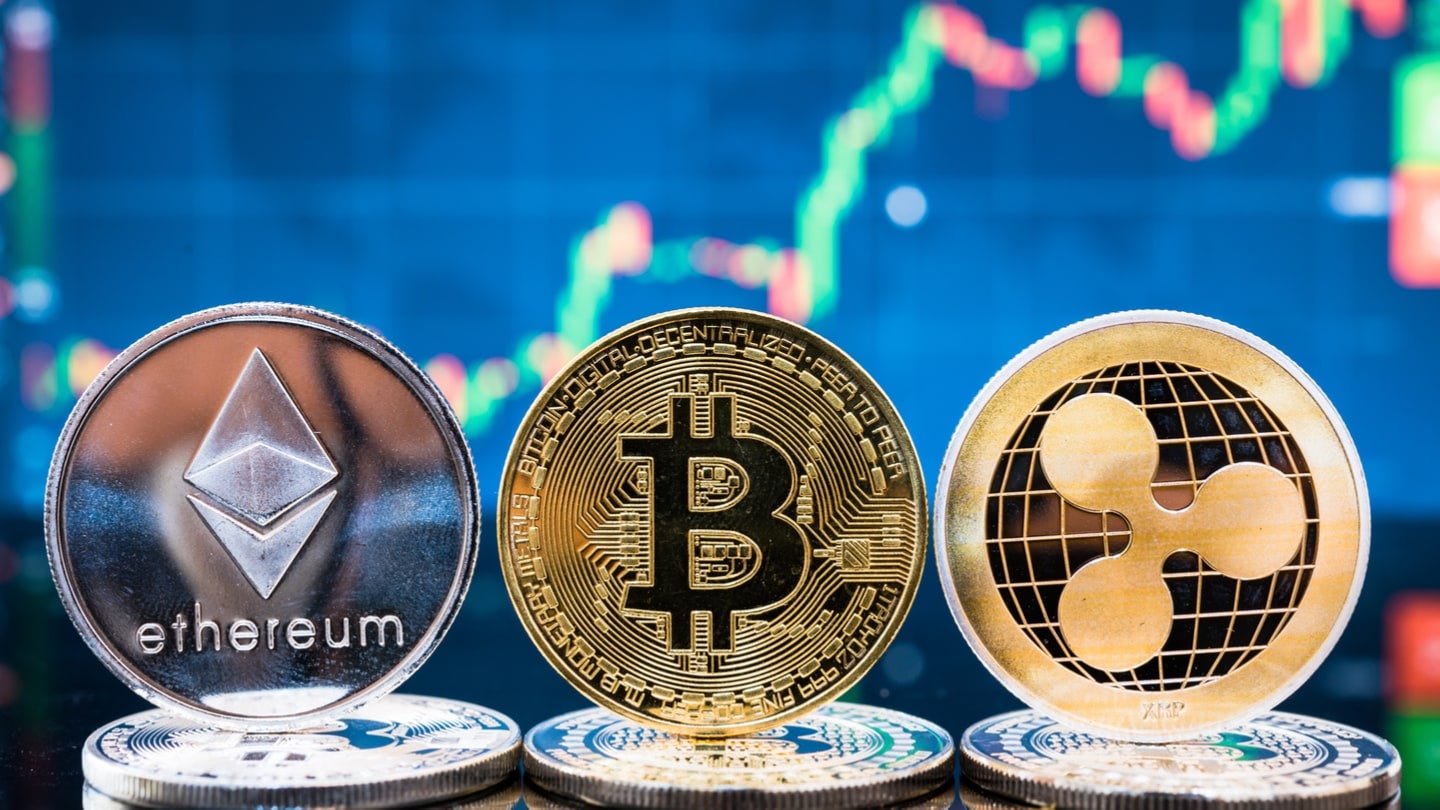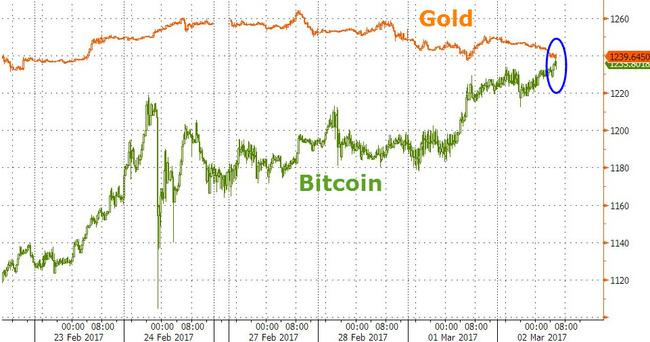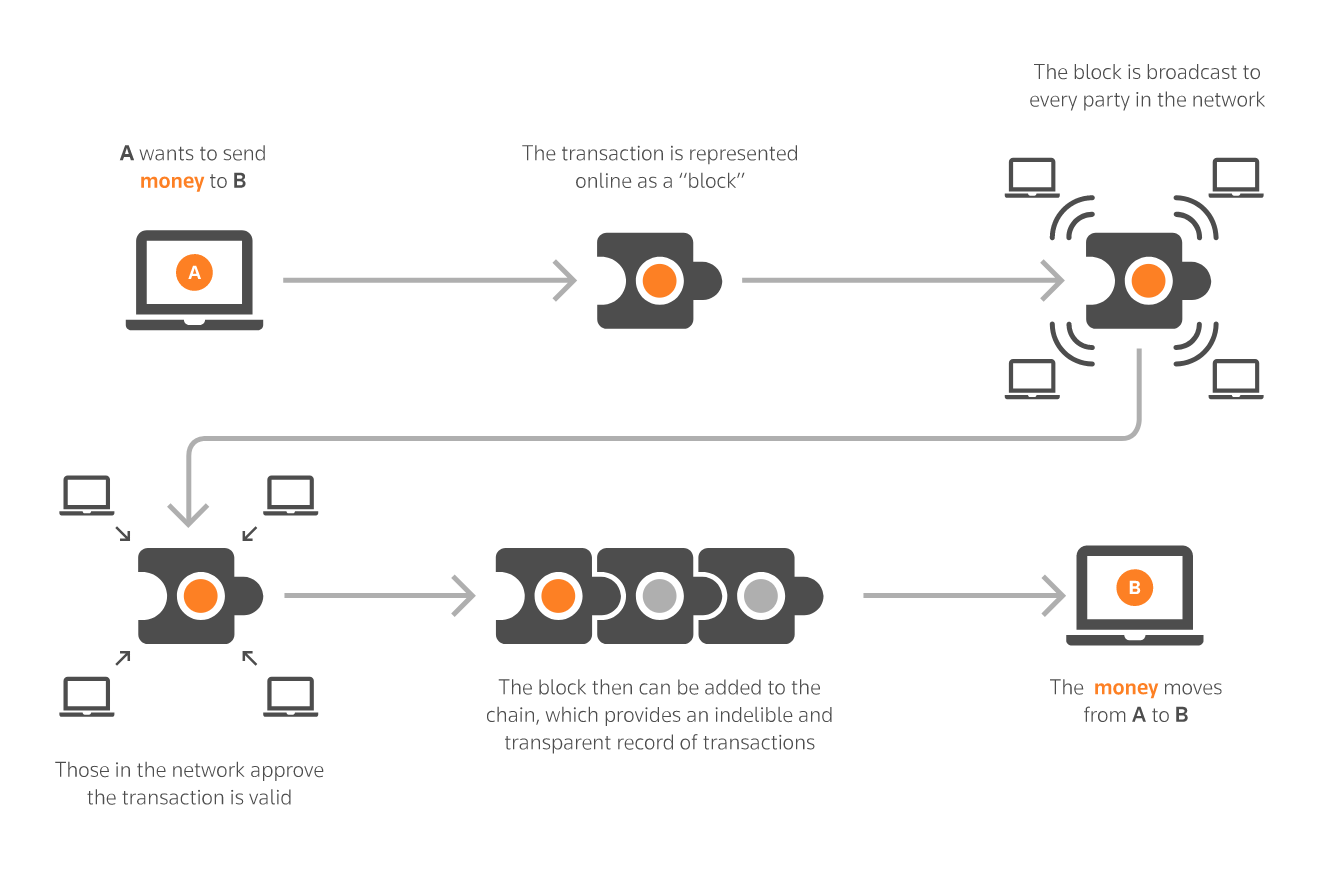Wiser in5! - Cryptocurrencies Explained!
The top 10 of cryptos, what they are and why Ethereum is important (and different to Bitcoin)
The market for cryptocurrency
As I put this article to bed, the market capitalisation of all the cryptocurrencies in existence is about $1.88 trillion. That puts the value of all of the digital currencies in the world as somewhere between the size of Brazil and Italy! (Strictly speaking I’m not comparing apples with apples, but hopefully you get my point!).
The point being that there is a significant amount of the world’s digital wealth tied up in cryptocurrencies already.
A better comparison would be with gold, which has a market cap in the region of $8 trillion, roughly 4 and a bit times the size of the crypto market.
Fun fact
Back in March 2017, the price of a Bitcoin reached parity with gold when they both hit $1,239 at the same time. However, Bitcoin has continued to rise and was trading at around $59k, compared to the price of gold at $1.7k at time of writing.
So, what makes up the crypto market?
What do we mean by Cryptocurrency?
Cryptocurrency defined: a digital medium of exchange using strong cryptography to secure financial transactions, control the creation of additional units, and verify the transfer of assets.
When we talk about crypto, we really mean 2 different things.
There’s pure cryptocurrency, like Bitcoin and Litecoin (think digital money). These are units of value that can be used to buy and sell things, like a Tesla Model 3, in the same way that you would use normal money, such as euros and dollars.
And then there’s AltCoins (think casino chips). AltCoins are fungible tokens that are used to run a computer network that performs a specific function. They’re not like normal money and not intended to be used to buy a loaf of bread at Tescos.
If you want to read a good explainer article on Bitcoin and cryptocurrency, go here.
The Top 10 of Crypto
By a country mile, Bitcoin is the dominant force and arguably mainstream when it comes to crypto. Whether that continues is a matter of conjecture.
Following up in 2nd place is Ether from the Ethereum network. Ethereum promises to be as disruptive as the Internet was 25 years ago.
And then there’s everything else. To help put it all into context and (hopefully) explain where it all fits together, here are the top 10 cryptocurrencies, ranked by market capitalisation (number of units multiplied by the unit price) as at 1st April (seriously, this is not an April Fool’s!);
Bitcoin - Mkt Cap $1.1 trillion (size of Mexico)
The crypto that dominates the sector. Most people have heard about Bitcoin by now, even if they don’t understand it (yet). It’s a digital currency but without any physical coins or notes.
There is no central bank or any institution or government that “controls” the currency. Instead of being controlled by a committee of bankers or economists, all financial transactions are governed by a consensus of participants on a network. All transactions are stored in a ginormous ledger called a blockchain that everyone has access too.It is this combination of no central authority controlling Bitcoin, and its transparency, that gives it a “trustless” state. Meaning that you don’t need to “trust” it because you know that what it says is as a true as night follows day.
The other thing to know about Bitcoins is that it is a scarce resource. There will only ever be 21 million of them. This is a major contributor to driving up its price! Because of it’s price volatility, Bitcoin has established itself as a store of wealth (like gold) rather than as a unit of value (like a dollar).
Ether/Ethereum - Mkt Cap $222bn (size of Vietnam)
Ether is the crypto for the Ethereum blockchain network. Think of Ether like chips in a casino. You exchange real money (called fiat) for chips (called tokens) that you then use to spend in the casino. Ether is the name of the tokens that are used on the Ethereum network.
Ethereum is a decentralised blockchain platform. 😕 It is often called the “world’s computer”, Web3 or the next Internet. Like the Internet, Ethereum is a network, it is not “owned” by an organisation, company or government.
Ethereum has a massive first mover advantage as the first software platform for the emerging world of decentralised applications (dApps), decentralised automated operations (DAOs) and smart contracts. Basically, these are lines of computer code that perform very specific tasks. They enable automated business operations without any human involvement, other than to write the code.These are businesses with no employees! All have the potential to massively change the way that many industries work.
For example, imagine having an insurance policy that paid you $100 if your flight was delayed 3 hours. Now, you’re at the airport and your flight takes off 3 hours and 5 minutes late. The insurance policy automatically pays you the $100 and it’s in your bank when you land. No need to make a claim. No need for someone to agree the claim. No human hand has touched the claim. That’s the future!The best way to think about what is happening here is to remember life before the Internet (assuming you’re old enough to remember that!). Think of how much our lives have been transformed by the Internet in just the last 2 decades.
The same is going to happen again because of platforms like Ethereum.
Read this article on the case for Ethereum.BinanceCoin - Mkt Cap $48bn (size of Lithuania)
The Binance Exchange is the world’s largest cryptocurrency exchange. This is where you can convert fiat money into cryptocurrency to buy and sell on the crypto market.
The BinanceCoin is the inner currency for the operation of the exchange (think about how I just described Ether like a casino chip). Owners of the BinanceCoin “stake” it in the platform and earn fees from it as it is used by others to perform the functions of the cryptocurrency exchange.
Tether - Mkt Cap $40bn (size of Tunisia)
Tether is what is known as a stablecoin, because it is, well, a coin that is stable. It earns it’s name because it is protected against price volatility by being pegged to the US Dollar, ie., 1 Tether will always be worth $1.
However, it is still digital money like the other coins in this list. Except that this one is 100% backed by reserves of fiat (real) money, but with all the advantages of blockchain technology.
Cardano - Mkt Cap $39bn (size of Paraguay)
Polkadot - Mkt Cap $35bn (size of Libya)
I have put Cardano and Polkadot together because that are both alternative platforms to Ethereum. And both were created by ex-members of the original 7 founders of Ethereum. These two platforms, along with Ethereum, are seen as the next generation of the Internet, aka Web3.
For those in the ‘Bitcoin is hype’ camp, the actual promise of a new world order powered by blockchain technology will come from the likes of Ethereum, Cardano and Polkadot, and not Bitcoin.
As illustarted by investment firm FD7 Ventures who recently announced plans to sell $750m of Bitcoin and move it into Cardano and Polkadot, stating “Bitcoin is actually pretty useless”. 🤔XRP - Mkt Cap $26bn (size of Uganda)
One of the biggest problems with the existing monetary payment platforms is cost, aka friction. This is why international money transfers are still so high, even if you use someone like Transferwise (now called Wise), you still have to give away alot in fees. One crypto solution is to run something called the XRP Ledger, which enables the movement of money with significantly less friction.
XRP is the cryptocurrency created by a firm called Ripple to provide speedy, less costly and more scalable solutions than the traditional platforms, like SWIFT for example. Other currencies can be used on the XRP Ledger, which is built on an alternative technology to blockchain called distributed ledger technology.
Footnote: what makes XRP stand out (controversial?) is that it is a centralised currency under the control of a company called Ripple. Ripple are under investigation from the US Securities and Exchange Commission who allege that the sales and distribution of XRP by Ripple were illegal, unregistered security offerings rather than the sale of digital tokens.Uniswap - Mkt Cap $15bn (size of Jamaica)
The UNI is the token issued by Uniswap to improve liquidity in DeFi trading (DeFi = decentralised finance apps). In DeFi trading, Uniswap enables market makers to move swiftly between different currencies without having to continuously exchange them.
Again, think of UNI like a casino chip. They make it easy for you switch between playing blackjack and roulette without having to change the chips you’re betting with when you go from one game to another.If you really fancy getting into crypto trading and dont want to be tied to the centralised exchanges like Binance, Coinbase or Bitstamp, then Uniswap offers a decentralised alternative.
Filecoin - Mkt Cap $13bn (size of Albania)
Filecoin is a decentralized storage system. Its aim is to “store humanity’s most important information”, i.e., data. Filecoin aims to store data in a decentralized way, unlike the existing cloud storage companies we use today from the likes of Amazon Web Services.Decentralized storage systems like Filecoin allow people to be their own custodians of their data.
Litecoin - Mkt Cap $13bn (size of Mozambique)
Behind Bitcoin, Litecoin is the second most popular pure cryptocurrency, mainly because it was created to be an easier and cheaper to use version of Bitcoin, i.e, lighter. Litecoin is one of the most widely accepted cryptocurrencies, and more than 2,000 merchants and stores now accept LTC across the globe.PayPal have just announced that it will now accept Litecoin as a method of payment, along with Bitcoin, Ether and BitcoinCash.
Its main benefit comes from its speed and cost-effectiveness. Litecoin transactions are typically confirmed in just minutes, and transaction fees are nearly negligible. This makes it an attractive alternative to Bitcoin in developing countries, where transaction fees may be the deciding factor on which cryptocurrency to support.
Word of Caution
The world of cryptocurrency and the underlying technology (blockchain) is still in its infancy. This is like being back in the mid 1990s when we first got excited by the potential of the Internet.
Back then, at the end of the 20th century, it was clear to the dot.com evangelists that it would be game changing, although few could imagine the world as we know it today, 25 years after those early days of the WorldWideWeb.
IMHO, everyone should now be interested and intrigued by what’s happening in crypto and blockchain. But also extremely cautious.
Whilst the whole market is now the size of Italy, this is primarily because of Bitcoin and Ethereum. Together these 2 cryptos account for around 3/4’s of the total market cap. Everything else is still relatively small, speculative and risky.
The promises and potentials are huge, but they are still to be proven. Just like investing in any startup business. Some of them might make it to be Amazon, Facebook or Google. But the majority won’t!
You’ll also see people online saying they’ve made 1000% gains in days. No doubt true in some cases. But they’re betting on penny stocks being pumped by online activity on platforms like Reddit and TikTok.
Eventually someone is going to get lucky, whilst many others will get burnt. Or it turns out to be a scam!
These huge movements in crypto prices are not being driven by fundamentals, but by a narrative. I’m not saying don’t do it, just be careful and don’t bet your house on it!
IMHO, Bitcoin is mainstream and here to stay. The major threat is either going to come from regulation (assuming governments can figure out how to do that), or quantum computing (although Bitcoin is unlikely to be the primary target when quantum computers reach maturity).
The same for Ethereum. The network has massive first mover advantage and many exciting possibilities. The Layer 2 changes and plans for Ethereum2 next year will address the performance issues surrounding speed, fees, price volatility. When fixed (and there’s still a question over whether Ethereum can fix its problems), you should expect an explosion in decentralised applications.
As for the rest of the cryptos, look at them as early stage businesses looking for investment. Caveat emptor my friend, caveat emptor!
Disclaimer: nothing in this article should be taken as encouragment or advice to invest in cryptocurrency. Anything you chose to do, is your choice. Remember, democracy is at the heart of crypto. Use it wisely!
What next?
You could….
a) Read Wiser in 5! about non-fungible tokens on Ethereum
b) Show your appreciation and buy us a €2 coffee
c) Tell us what you thought about it
d) Send us some love by hitting the little heart button (🤗 we like it when you do that 🤗)
Thanks for reading and appreciating what we do!
See you next week…and happy holidays!










This was a comment from a Pat C that related to this article, but went onto a different one because I used the wrong link...Rick
Pat Cromagnon2 hr ago
Hi Rick,
Re today's crypto corner, many things are beyond my level of understanding but,
Coinbase - You have a company that is essentially an exchange/clearing house/depository with one asset, crypto, all be it in many different guises.
Comparable "understandable" companies could include ICE, LSE Group, Deutsche Borse Group etc. The largest of these ICE had $8.2 billion of revenues and a market cap of $65.3 billion. I can see the benchmark but not the rest of what supports Coinbase’s valuation.
A few things and you heard them here:
When a company lists but raises no money for the company, it only raises money for the selling shareholders. They are cashing out because they believe its valuation has peaked, a very bad sign.
The market cap of the comparable companies is based on the portfolio of assets, businesses, markets etc which is much more resilient than being “the place for crypto." Again, not raising money to fund the company’s expansion means even they think they it is a one trick pony.
For any of these companies, particularly ICE to add crypto to their platforms would be dead simple and they could easily add derivatives on crypto. Some already have or are thinking of it..
Coinbase was probably hoping one of them would buy it but I’m guessing most would have had a look and asked “What do I get for $68 billon? Answer? SFA.”
That leads the selling shareholders to an obvious exit strategy. Link the value of Coinbase to skyrocketing crypto values. How does that work? How does Coinbase make more money when crypto values skyrocket? What happens when and if they crash again?
I might feel different if I had 3,339 BTC in my wallet.
Pat Cromagnon
Learned a lot. But what I really want to know is can I use a Bitcoin as a marker on a putting green?